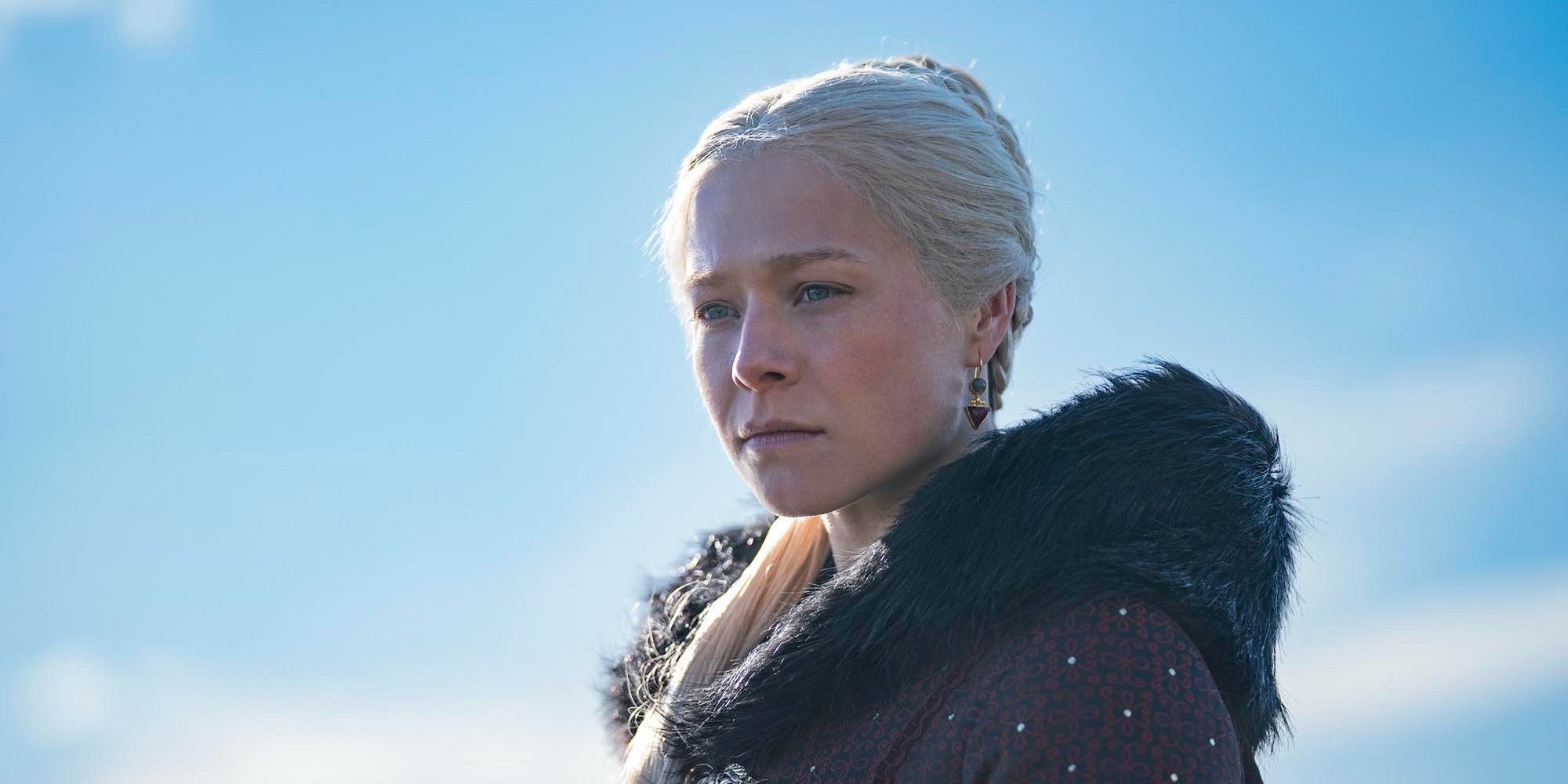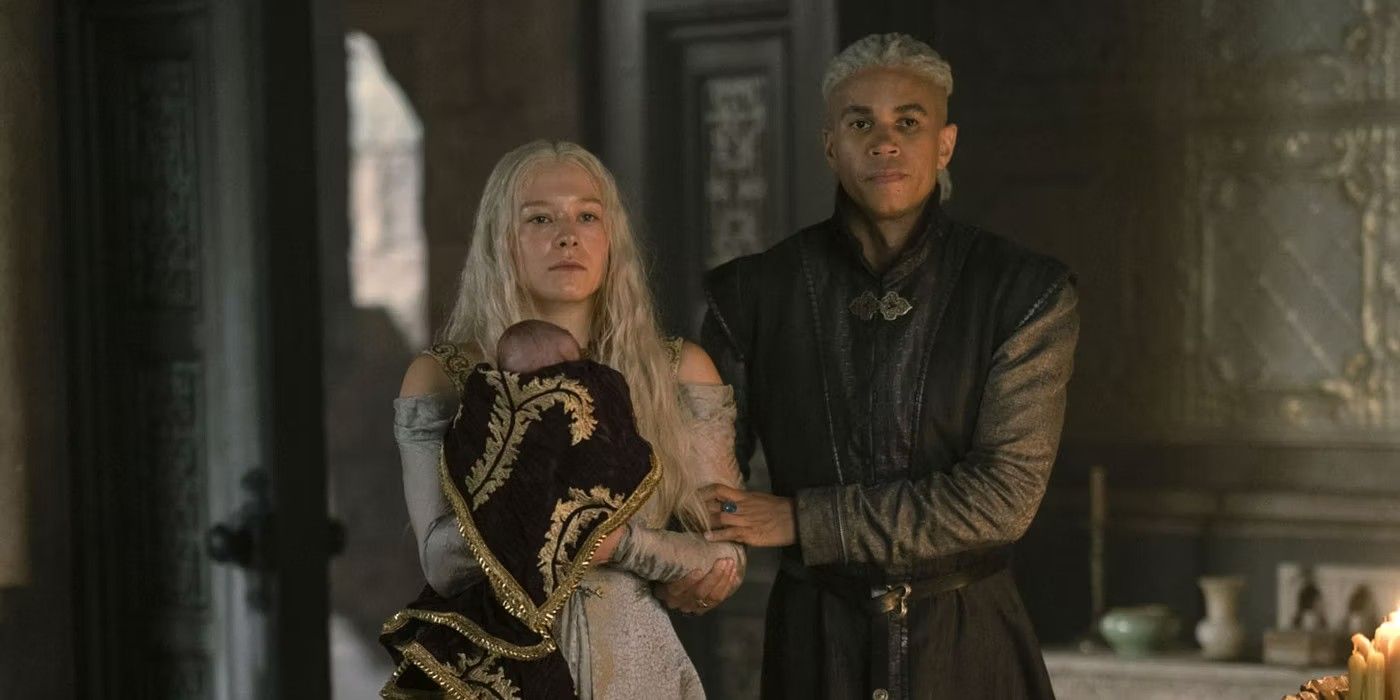Warning: SPOILERS for House of the DragonHouse of the Dragon actor Emma D'Arcy has revealed the considerations that went into bridging their true, non-binary identity and professional image. D'Arcy stars as the adult version of Princess Rhaenyra Targaryen, the oldest child of King Viserys Targaryen (Paddy Considine) and heir to the Iron Throne. Set 200 years before the events of Game of Thrones, the House of the Dragon prequel series examines a significant event in Westorosi history: the Targaryen family civil war, known in-world as the Dance of the Dragons.
The series' primary conflict is Viserys' succession, as Rhaenyra would be the first female on the Iron Throne and her enemies don't believe she has the fortitude to rule. The show alluded to a running scrutinization of gender dynamics early on. In episode 1, a flashback revealed that the crown passed over Rhaenyra's aunt Rhaenys (Eve Best) to Viserys partly on the basis of gender. As in the case of the real world, the characters are wondering if the power brokers and greater population have grown to accept a virtuous leader regardless of identity with the passage of time.
D'Arcy explained to Interview Magazine their thoughts on sharing their identity with the casting department and the public. Working as a known television actor since 2018, D'Arcy has witnessed the growth of identity transparency and its reception. Their decision to come forward is meant to serve as an inspiration to younger actors and creative professionals. Read D'Arcys full comments below:
"This is the first job in which I’ve brought my non-binary identity to work. And part of that was because HBO asked me what pronouns I use, and I thought a lot about whether this was the right time. The reason it’s important is that there was a point, earlier in my career, where I really worried that it wasn’t possible to be an actor if you aren’t a cisgendered person. Typically, within casting sites, there are two columns, and I wondered if those two identities were going to have to live separately in order for me to have a career. The reason I decided to be honest in my presentation professionally is that I really hope that younger people who want to do this work know that there is absolutely space and that space is opening up."
How House Of The Dragon Is Improving Game Of Thrones’ Inclusivity Record
There is a strong perception that Hollywood is a progressive institution, but it could be argued that aura mostly radiates from independent celebrity activism and southern California's left-leaning politics. The representation of non-hetero normative characters is improving, but they often meet unfavorable demises. Game of Thrones was accused of treating ill-fated, LGBTQ+ characters like Renly Baratheon (Genly Anthony) or Oberyn Tyrell (Pedro Pascal) as disposable or using their identity to make a statement about their otherness. In House of the Dragon episode 7 "Driftmark", this trope was undermined when Rhaenyra's spouse Laenor Velaryon (John Macmillan), a gay man who she married for political reasons, faked his death and escaped the intolerant customs of his family. This was a deviation from the source material, the novel Fire & Blood, in which Laenor is killed.
The original series ended in 2019, and in the years of development behind House of the Dragon, the network, producers, and creator George RR Martin made narrative and personnel choices that signal greater consideration for dignity in inclusivity. Showrunners Ryan Condol and Miguel Sapochnik, inspired by Martin, elected to re-imagine House Velaryon as Black nobles and create a space for prominent, distinguished Black characters. Outside the world of the story, D'Arcy was cast as one of the first non-binary leads of a series as large as House of the Dragon, and as they said, it was HBO who first inquired about their pronouns rather than making an assumption. House of the Dragon is imperfect, and has repeated some of Game of Thrones' mistakes, but is overall a better vessel for empowerment than its predecessor.
Source: Interview Magazine


